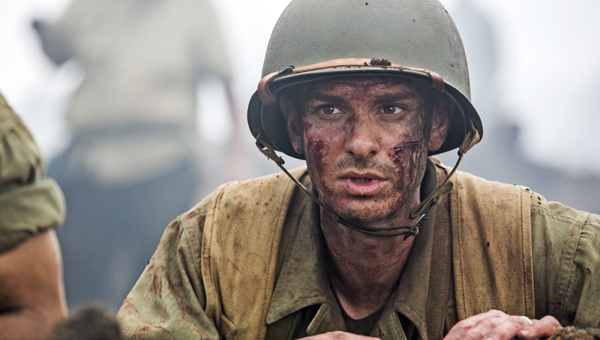Hacksaw Ridge Blu-ray Review

Mel Gibson and violent movies.
Whether he’s on leading man duties, as a burnt-out cop or futuristic road warrior, or behind the camera, overseeing resistance to British rule in 13th-century Scotland or the graphically-depicted crucifixion of Christ, he is not one to shy away from a spot of bloodletting.
And whatever you say about his politics, Gibson usually turns in good work on the big screen.
Hacksaw Ridge sees his first cinematic foray into World War II territory.
This seems like natural stomping ground for the Gibsonator, even if it is a genre already well-explored by the directorial greats.
The soft, southern lilt of a pacifistic soldier plays over the opening scenes. Memories of The Thin Red Line flood back, along with initial fears that Gibson’s work will amount to little more than a collage of war-movie tropes.
Thankfully this does not transpire to be the case.
What sets this film apart is the time invested by Gibson in the back story of the real-life protagonist, Desmond Doss.
Doss (Andrew Garfield) was the son of a First World War veteran and a Seventh Day Adventist who saw it as his duty to serve when his country called.
However a childhood incident, in which Doss seriously injured his brother Hal, reinforced his religious views and in particular the commandment ‘Thou Shalt Not Kill’.
Doss decides to join the army as a combat medic but only on the basis that he is a conscientious objector who will not kill anyone.
This, naturally, does not go down well with his superior officers and fellow soldiers, who see him respectively as insubordinate and a liability.
This is probably the right time to flag a spoiler alert to those unfamiliar with the story.
Doss proves to be one of the bravest soldiers in his unit, saving many lives during the Battle of Okinawa and was ultimately awarded the Medal of Honor.
Gibson holds back from getting involved in the wartime action until the second half of the film, giving the characters time to breathe.
The action scenes when they come are expectedly impressive; suitably chaotic but always coherent. A chase through one of the tunnels is particularly thrilling.
Of course there are flaws. Historical liberties are taken and, as with any war movie, sides are chosen. The Japanese soldiers are depicted as inhuman ghouls alternating between shrieking antagonists or screaming cannon fodder.
But the wider war is not the real focus here. The central conflict of the film lies away from the battlefield, instead coming through Doss’ strength in his own convictions in the face of adversity from those around him. This is the true struggle at the heart of the story.
Garfield ably juggles naïve idealism with gritty determination in the central role, supported by Sam Worthington and, in a successful twist of casting, by Vince Vaughan as Doss’ commanding officers. Hugo Weaving puts in one of his best performances of recent years as Doss’ father.
The battlefield scenes therefore primarily serve as a final test of Doss’ resolve and his potential redemption in the eyes of all who doubted him. And this all pays off thanks to the film’s earlier investment in the character.
A very human story played out in the most inhuman of circumstances, this is one to catch.
Conor Brennan